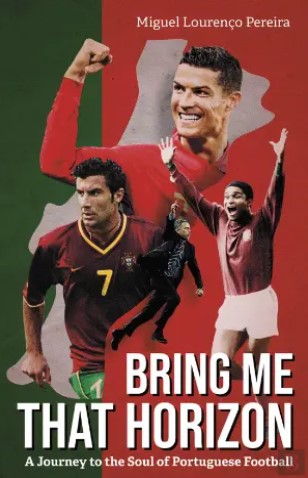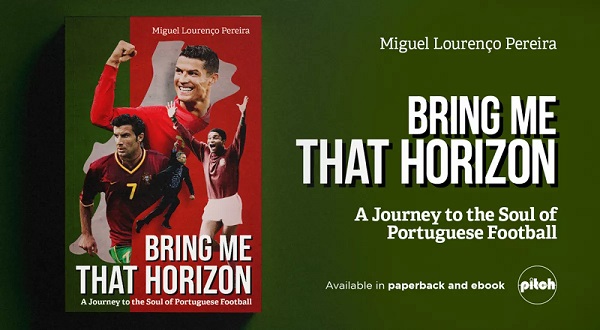 PortuGOAL’s book section is back with a must-read for all lovers of Portuguese football. Football historian and author Miguel Lourenço Pereira has produced a magnificent work that explores the fascinating myriad of football landscapes past and present in Portugal.
PortuGOAL’s book section is back with a must-read for all lovers of Portuguese football. Football historian and author Miguel Lourenço Pereira has produced a magnificent work that explores the fascinating myriad of football landscapes past and present in Portugal.
From the deep-rooted African and Brazilian connections to the intense rivalries between the nation’s biggest clubs, from the roller-coaster rides of the national team and the reasons for its recent ascension on the world stage to the explosion of Portuguese footballers and coaches triumphing abroad, Pereira brings it all to life in vivid detail while employing a riveting narrative.
But if you think Bring Me That Horizon is a book only about Portugal’s Big Three, the Seleção and its superstars, think again.
Many of the most memorable of the 14 chapters depict clubs that in bygone times were among the most important in the country and were veritable incubators for world-class talent but which subsequently fell on hard times, some of which became extinct altogether and others that made or are in the process of making a comeback.
The wonderfully researched stories are intertwined with the history, culture and politics of Portugal itself, enabling the reader to grasp an understanding of its people’s obsessive relationship with the beautiful game and shining a light on a unique football culture. - Tom Kundert
PortuGOAL interview with the author Miguel Lourenço Pereira
PortuGOAL: Congratulations of a magnificent book Miguel! You have written several books on specific aspects of football. What was the motivation behind Bring Me That Horizon?
MLP: I would have to say this was perhaps my most emotional book to date. I began writing from a macro perspective of football, the history of the European Cups, the World Cups, and the Euros, and somehow I thought that I needed to take a more personal approach to how I see and write about the game.
It also struck me as odd that a nation which has so many great stories to tell and that is so important to today’s game, had so few books about it, not only in Portugal but around the world. I have hundreds of books and could not understand why so few had taken an interest in Portuguese football.
Also, I may add, that after writing books in Portuguese and Spanish, I wanted to challenge myself in writing my first book in English. It was a demanding task but also one that gave me extra motivation to raise my game and write the best book I could.
PortuGOAL: The book is beautifully researched and embellished with first-hand quotes and opinions from dozens of protagonists from all quadrants of the game. Tell us about the process of putting it all together.
MLP: It was a challenging experience. My previous books were more focused on history, so they meant watching hundreds of matches. This one was a more dynamic experience, it included travelling a lot inside Portugal, visiting places, and stadiums, and talking with a lot of people that I considered could bring up interesting topics to discuss and that had something to say about the identity and soul of the game in Portugal, which was really all the book was about.
It became also a very personal book because it took me back to my childhood days as a supporter, travelling around, seeing a country that has since then changed so much but also finding that some things remain the same.
In the end, it became a mix of research, watching football matches live and taped, talking to very interesting people and travelling around. Perhaps it is that mix that makes the book interesting for the reader.
PortuGOAL: Which chapter gave you most pleasure to research and write, and why?
MLP: That is hard to say because all chapters were special in one way or another. I would say New Kids on the Block, the chapter dedicated to the rise of the Golden Generation and how youth setups became so important in Portuguese football because it allowed me to do three important things.
First, to talk about the seed that was planted forty years ago and explain why now Portugal is considered a top nation in European football, why so many world-class players are spread throughout the biggest leagues and clubs and why Portugal is a real contender to win the next Euros or the World Cup.
It also allowed me to add importance to cultural references as it was a period of great change in Portuguese society, in music, cinema, fashion, and lifestyle and that is also an important part of the book, how football can change a country and be shaped by it at the same time.
And finally, because it allowed me to do justice to one great man, Carlos Queiroz. Without Queiroz, a man who has been vilified in the last couple of decades because of projects gone wrong in Madrid or with the national side, Portugal would still be a B-side national team and Portuguese clubs would be even further away from the elite. The way he changed how the game was studied and analysed and how he started a wave of change that would be the reason why we have Mourinho’s and Ronaldo’s in the first place cannot ever be underestimated.
PortuGOAL: What do you think are the chief factors that explain Portugal’s continuous ability to punch above its weight in the world’s most popular sport in terms of club football, talent production and the national team?
MLP: It is hard to explain why Portugal in reality is like the European Uruguay. Only 10 million people live here, give or take, and yet we have produced, generation after generation, world-class players and also coaches.
I think it has to do with the ability to adapt. Portuguese have always adapted better than other nations to circumstances. They had to. It still is a poor country, there’s an abyss between a very few and the majority of the population in terms of their economic, social and cultural background.
It is a country focused only on its coastal and urban culture that has left more than half of the nation in oblivion. A country of millions who were forced to leave against their will because of extreme poverty. And wherever they go, they adapt to new realities.
Football expresses that as well. There’s no tactical school in Portugal. Training is done in a very pragmatic way, players are highly competitive, coaches take a no-nonsense approach whenever they can, and that will to survive at all costs, something that comes from the age of the explorers, has somehow entered the game’s DNA and explains why we are such a competitive nation.
 PortuGOAL: As well as Portuguese football, you are a scholar and a walking encyclopaedia of the game throughout the world. Compared to football in other countries, what do you think most needs to be improved/changed for the good of Portuguese football?
PortuGOAL: As well as Portuguese football, you are a scholar and a walking encyclopaedia of the game throughout the world. Compared to football in other countries, what do you think most needs to be improved/changed for the good of Portuguese football?
MLP: There are definitely things to change but I don´t think they have to do exclusively with the game. They are intertwined with the national ethos and that makes it harder to imagine we will be seeing different approaches in the near future. Portugal needs better referees, better chairmen, better infrastructure and better supporters.
It is like we have all that it takes to be great - players and managers - but not enough to make that greatness sustainable and able to grow beyond, because of everything that surrounds it. Portuguese referees are not only of poor quality but they are also living in a permanent state of suspicion, which in turn makes them even more prone to mistakes. It’s only human when you know that during the week you will be the only talking point about a match when there are 22 players on the pitch and two managers on the sidelines who also make mistakes.
Chairmen have been primarily responsible for that culture of suspicion, especially since the 1980s, and if you ask a German supporter the name of the chairman of a Bundesliga club he may not know but in Portugal, chairmen are even more socially relevant than players and managers. It is not exclusively a Portuguese reality; if you go to Italy or Spain you find that as well, but it explains why our approach to the game is such a small mindset.
The chairmen, in turn, are also responsible for the poor infrastructure of many clubs. They don’t seem to care about anything related to the institution or its local connection with the community and are okay with having two stand stadiums, crippling from the inside out, unattractive to supporters during the winter and without any access to public transportation.
But of course, in the end, the supporters are primarily to blame. Portugal is a three-club nation, something deeply rooted in the society, so there is no localism, no desire to support your local team. And because of that there is no pressure on the owners or chairmen to do things right. People care so little about their local team in comparison with the Big Three clubs they support, that in the end, they condemn any possibility of growing. Until someone decides to break the wheel and put the local team and the local supporter first and in turn they respond and play their part in creating a sustainable environment for football to grow, things will remain the same.
Competition time
PortuGOAL: Once again, parabéns Miguel on writing a book that I am certain will give hours of enjoyment to readers all over the world. Please set a question for visitors to our website for the competition to win the book.
MLP: In the book we talk in depth about Brazilian players who ended up playing for the Portuguese national side over the years. One of them was Deco, then a leading figure of José Mourinho’s Porto and later also a legend at Barcelona. But, against whom did Deco play his first match for Portugal and who was the player that was substituted off when Luiz Filipe Scolari gave him his first cap?
To win a copy of Bring Me That Horizon, send the answer to Miguel’s question above to
Article update
Congratulations to Roberto Miranda from Quebec, Canada, whose name was drawn out of the hat from all the correct answers received. Deco made his debut for Portugal against none other than Brazil, and he came on as a second-half substitute for Sérgio Conceição, the current Porto coach. For good measure Deco also scored the winning goal direct from a free kick.
Bring Me That Horizon by Miguel Lourenço Pereira is published by Pitch Publishing.

